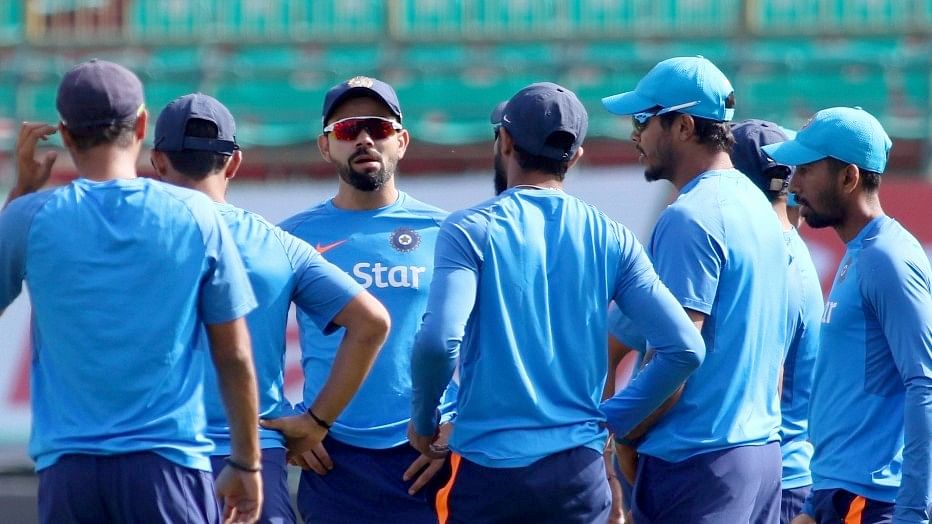In Stats: Virat’s Perfect Record and Pacers’ Heaven in Dharamsala
Statistician Arun Gopalakrishnan previews the 4th Test between India and Australia through some interesting numbers.

After three intensely fought Test matches, it all comes down to this; who takes home the Border Gavaskar Trophy depends solely on the outcome of the fourth and final Test match between India and Australia. The concluding Test of the series will be played at the HPCA Stadium in Dharamsala – which is all set to join the list of Test venues in India on Saturday.
Heading into the decider, the two teams are locked at one Test win apiece. Australia began the tour with a statement, winning the first Test match in Pune, before the home team came back in style, winning the second Test in Bengaluru. Australia put up a good fight in the third Test in Ranchi and salvaged a draw.
The equation for Team India is simple; win the decider in Dharamsala and take home the Border Gavaskar Trophy. If Australia manage to even eke out a draw in the decider, the trophy will travel to Australia, for Steven Smith’s side are current holders of the trophy – which they won in 2014-15 – and a drawn series will be enough for them to cling on to it.
The Indian team hasn’t lost a series since Virat Kohli has been handed the reins of the Test team, and it is in this context that there will be a bit of pressure in the Indian team. After Virat Kohli was named the regular captain of the Test team, the Indian Test team drew the one-off Test against Bangladesh in June 2015 and followed it up with six consecutive series wins. One senses there will be a bit of desperation in the Indian camp – and among supporters – to extend that run of series wins.
The HPCA Stadium is nestled in the foothills of the Himalayas, and the high altitude and prevalent climatic conditions are expected to aid pace bowlers. History too points to the fact that quick bowlers will have a lot going for them. In the three Ranji Trophy matches played at Dharamsala this season, quick bowlers picked up 88 wickets at a wicket every eight overs, while spinners only managed eight wickets at a wicket every 22 overs.
These numbers are in stark contrast to what has happened in this series; in the three Test matches so far, spinners from both sides have picked up 72 wickets altogether, while the quick bowlers have picked up 32 wickets in total.
Hitherto in the series, the Indian spinners have not only picked up more wickets than their quick-bowling colleagues but have also bowled more than twice the numbers overs their quick bowling-teammates have bowled.
Given how much conditions are expected to be in favour of the quick bowlers, the Indian team management will be faced with some difficult decisions to make. Do they continue with both the spinners in the eleven or do they bench one of the spinners for a third medium pacer? Or do they revert to the five-bowlers theory and field an extra quick bowler?
Bhuvneshwar Kumar, who thrives in conditions where there is a bit of nip in the air and a bit of juice in the wicket, is most-likely to join the eleven if India decide to go the five-bowlers way.
The Indian team management – comprising captain Virat Kohli and coach Anil Kumble among others – will have to pick the eleven knowing that the lower order hasn’t quite contributed to the extent they did earlier in the home season. Also, going in with only five specialist batsmen could be a huge risk – given the conditions are expected to be lopsided in favour of the quick bowlers.
The problems of the Indian team management are compounded further by the injury to the captain. Addressing the media on the eve of the Test, Virat Kohli maintained that he would only play if he was 100 per cent fit. If Virat is forced to sit out, it will be a big blow to Team India; the team will not only miss Virat in the batting line-up, they will also miss a very good leader of men.
The selectors have named Shreyas Iyer as a cover for the injured Virat; the Mumbai batsman followed up his 1,321 runs in the previous Ranji Trophy season with another excellent season. The 22-year old Shreyas scored 725 runs in this season’s Ranji Trophy and even impressed scoring stroke-filled centuries against Australia and Bangladesh in the pre-series warm-up matches.
Given how much rides on this series and how passionate and competitive Virat Kohli is, one expects he will take the field on Saturday morning even if he is close to being 100 per cent fit.
Where the Australia team is concerned, they are expected to field the same batting line-up, but will most likely make one change to the bowling attack; it is expected that Steven O’Keefe will make way for one of Jackson Bird or all-rounder Marcus Stoinis.
Probable XIs:
India: Murali Vijay, KL Rahul, Cheteshwar Pujara, Virat Kohli, Ajinkya Rahane, Ravichandran Ashwin, Wriddhiman Saha, Ravindra Jadeja, Bhuvneshwar Kumar, Umesh Yadav, Ishant Sharma.
Australia: Matt Renshaw, David Warner, Steven Smith, Shaun Marsh, Peter Handscomb, Glenn Maxwell, Matthew Wade, Marcus Stoinis, Pat Cummins, Josh Hazlewood, Nathan Lyon.
(At The Quint, we are answerable only to our audience. Play an active role in shaping our journalism by becoming a member. Because the truth is worth it.)